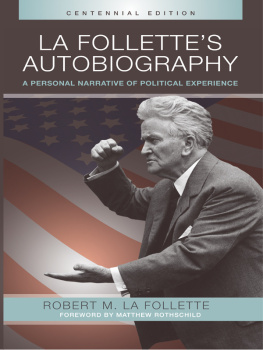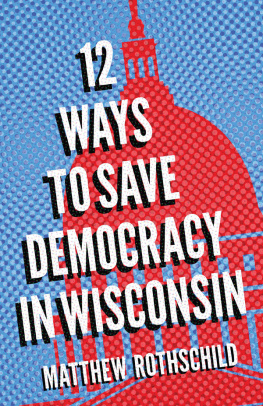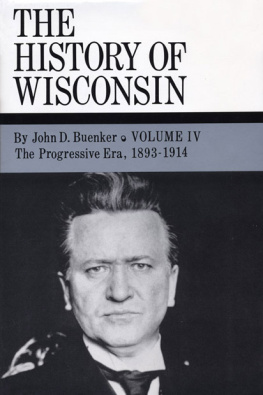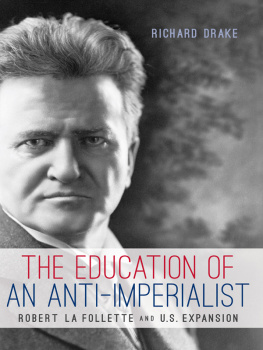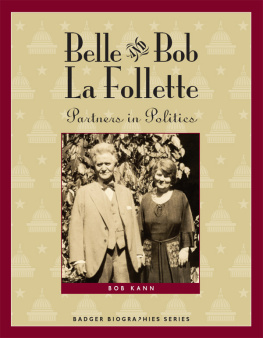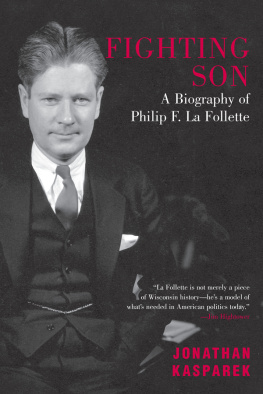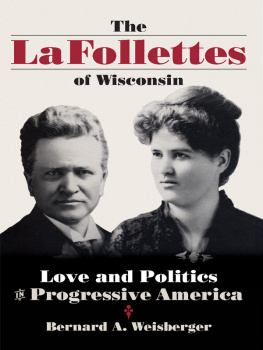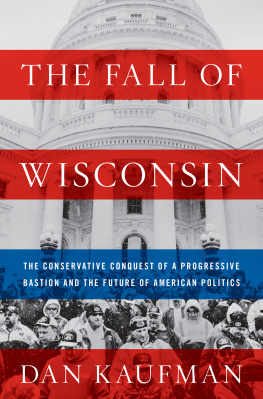La Follettes Autobiography
La Follettes Autobiography
A Personal Narrative of Political Experiences
Robert M. La Follette
Foreword by Matthew Rothschild
The University of Wisconsin Press
The University of Wisconsin Press
1930 Monroe Street, 3rd Floor
Madison, Wisconsin 53711-2059
uwpress.wisc.edu
3 Henrietta Street
London WC2E 8LU, England
eurospanbookstore.com
Copyright 1911, 1913 by Robert M. La Follette
Copyright renewed
Copyright 1960, 2013
The Board of Regents of the University of Wisconsin System
All rights reserved. No part of this publication may be reproduced, stored in a retrieval system, or transmitted, in any format or by any means, digital, electronic, mechanical, photocopying, recording, or otherwise, or conveyed via the Internet or a website without written permission of the University of Wisconsin Press, except in the case of brief quotations embedded in critical articles and reviews.
Printed in the United States of America
Library of Congress Cataloging-in-Publication Data
La Follette, Robert M. (Robert Marion), 18551925, author.
La Follettes autobiography: a personal narrative of political experiences /
Robert M. La Follette; foreword by Matthew Rothschild.
pages cm
Includes index.
ISBN 978-0-299-29714-5 (pbk.: alk. paper) ISBN 978-0-299-29713-8 (e-book) 1. La Follette, Robert M. (Robert Marion), 18551925. 2. United StatesPolitics and government18651933. 3. WisconsinPolitics and government18481950. 4. PresidentsUnited StatesElection1912. 5. LegislatorsUnited StatesBiography. 6. GovernorsWisconsinBiography. I. Rothschild, Matthew, author of foreword. II. Title.
E664.L16L16 2013
324.973912dc23
2013028360
Contents
Foreword
F or the past two decades, its been my honor to serve as the editor of The Progressive magazine, which was founded by Robert (Fighting Bob) La Follette in 1909. He is a friendly ghost around the office. We open the old, crinkly volumes of La Follettes Weekly, as it was originally called, and read his forceful editorials, and were astonished and sometimes aghast at how relevant they are today.
If you have only the faintest idea who this man was, then youre in for a real treat, for here is a politician of consummate integrity. Hes like Jimmy Stewart in Mr. Smith Goes to Washington. Incorruptible, principled, and stubborn in the best way. (Youll even find an account of La Follettes nineteen-hour filibuster in these pages.)
Like Jimmy Stewart and, for that matter, Ralph Nader, Fighting Bob put his finger on the central problem of our economy and our democracy: what he called in this book the problem of the corporate interests, or the struggle between democracy and privilege, or the encroachment of the powerful few on the rights of the many.
As a young man, La Follette heard the chief justice of the Wisconsin Supreme Court, Edward G. Ryan, put the issue plainly in 1873: Which shall rulewealth or man? Which shall leadmoney or intellect? Who shall fill public stationseducated and patriotic free men, or the feudal serfs of corporate capital? This speech made a huge impact on La Follette, and he would quote from it many times in his public life.
He also saw, up close and personal, the efforts of the political bosses and the railroad lobbyists to seduce, threaten, and bribe their way under the dome of the Wisconsin capitol and in Washington, D.C. As he recounts here, still almost visibly shaking with indignation, he was offered more than once to sacrifice his principles for a pile of cash and a cushy job, but he refused.
In these pages, we meet La Follette the reformer, first in the House of Representatives and then as governor of Wisconsin (a post he lost twice before winning two terms). With a progressive majority in the state legislature, La Follette was the first to institute the direct election of candidates through the primary system. He regulated the railroads and the banks. He instituted an estate tax and an income tax. He curbed child labor and established a system of workers compensation. He fought for womens suffrage. And he tried to pass campaign finance reform. (Horrified would he be today upon learning of the U.S. Supreme Courts Citizens United decision, which has legalized unlimited corporate expenditures in our political races.)
La Follette continued in his role as reformer when he was elected to the U.S. Senate in 1905. He recounts here his battles to regulate not only the railroads but also the coal companies, the oil companies, and the banks. A dozen men control the business of the country, he writes in these pages. Standard Oil and Morgan are the real business kings of America.
But La Follette was more than a quixotic slayer of corporate dragons. He also was a champion of womens rights, Native American rights, and civil rights for African Americans. As well, as the publisher of La Follettes Weekly (which became The Progressive in 1929), he understood the value of the independent press and warned of the subserviency of the press to special interests. At the end of this book, youll be able to read the speech La Follette delivered to the Periodical Publishers Association in 1912. It not only lays out his critique of the media but also offers up his history of corporate power.
Much of the second half of this book revolves around La Follettes split with Teddy Roosevelt, whom he believed to be a bit of a phony when it came to challenging corporate power. Roosevelt did not propose to disturb his pleasant relations with the big manufacturing trusts, La Follette writes. And so La Follette organized the National Progressive Republican League and ran for the nomination of president within the Republican Party in 1912, only to be outmaneuvered by Roosevelt, who made a tardy entrance.
In this volume, you get an occasional glimpse of La Follettes bouts with what may have been manic-depression, which waylaid him intermittently throughout his career. Nancy Unger in Fighting Bob La Follette: Righteous Reformer notes that his granddaughter strongly suspected that he suffered from this illness. Certainly, he was sidelined for months at a time with what he sometimes called exhaustion. If youre interested in his psychological makeup, you can look for those clues here.
La Follettes autobiography ends in 1912. In the last dozen years of his life, his reputation as a man of principle only grew. Other than Eugene V. Debs, there may have been no braver man in America as the United States drifted toward World War I. La Follette denounced the arms manufacturers and actually called for nationalizing them. And in 1917, he said: Every nation has its war party. It is not the party of democracy. It is the party of autocracy. It seeks to dominate absolutely. It is commercial, imperialistic, ruthless. It tolerates no opposition. It is just as arrogant, just as despotic, in London, or in Washington, as in Berlin. The American Jingo is twin to the German Junker.
In words that still rang so painfully true when George W. Bush dragged the United States into war against Iraq on a leash of lies in 2003, La Follette warned: If there is no sufficient reason for war, the war party will make war on one pretext, then invent another, possibly more effective, pretext after war is on. When the nation is in a war fever, he understood the great cost to our civil liberties: The most sacred constitutional rights guaranteed to every American citizen, he said, are violated in the name of democracy.

